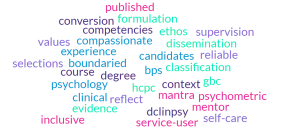
When looking at applying for the Doctorate in Clinical Psychology there can be words that you may come across that may be difficult to understand. There can be lots of “psychological jargon” used and people often talk about “buzzwords”. Once you have worked within the psychology field for a long time this kind of language can become second nature however, it takes time to become familiar with this language. We have collated a list of commonly used words that you may find within the application process and have tried to explain them as best we can!
Boundaried
Being aware of your own limits, knowing what you are comfortable with and setting out expectations in relation to yourself and others. For example, how comfortable you feel sharing personal information with others or not taking on too much work to ensure you don’t become overwhelmed.
British Psychological Society (BPS)
The BPS is a charitable organisation promoting the work of psychologists across many different fields. This can include clinical psychology, forensic psychology, educational psychology etc. They have lots of information on their website regarding the different careers someone can go into within the field of psychology. See GBC for further information.
Candidates / Applicants
This is you! Someone who is applying for a job or for acceptance for a membership/register. These words might be used interchangeably.
Clinical Experience
Universities often advise that you need to have “clinical experience” so what does this mean? This can differ from university to university. Broadly clinical experience is a role that will help you to develop skills that individuals who are clinical psychologists are expected to have. Relevant clinical experience may be within the NHS or outside the NHS. Their hope is that people will have gained experience of what it may be like to work within health or social care and the challenges that this can bring. This will help individuals to know that this is the right field of work for them. This experience can be gained in a wide range of job roles such as assistant psychologists, support workers, health care assistants, social workers, nurses, health day centres, research assistants within a health-related area. Experience can be gained through paid or voluntary positions – though it is important to look at the university you are wishing to apply for to see what their requirements are as this can differ.
Compassionate
A sensitivity towards other people’s feelings of sorrow or distress, usually involving a desire to help or comfort that person.
Context
Context in psychology refers to the situation or circumstances in which an event occurs. Context can influence how someone interprets what they see. For example, behaviours can be understood through the context in which they occur – is someone being rude or have they had multiple bad things happen that day and this was a reaction to that build up. Your context can be influenced by political, cultural, social and economical events throughout your life.
Competencies
The minimum level of skills, knowledge, abilities, values, behaviours and other characteristics needed to work capably as a clinical psychologist. There are a number of core competencies required for you to become a clinical psychologist and be accepted onto the HCPC register. Each university offering the DClinPsy course will provide teaching and learning opportunities to help you to develop these competencies.
Conversion Course
A psychology conversion course is a postgraduate degree that can prepare someone for a career in psychology when they have completed an undergraduate degree in a different subject.
DClinPsy/DClinPsych
These terms are abbreviations that are often used. They stand for the Doctorate in Clinical Psychology. Resources or courses may use these abbreviations on social media so searching for this term can also be helpful.
Degree Classification
When you have completed a degree, you will be awarded a classification which is often an average mark across the assignments and exams you have completed. You will be asked to send a copy of your grades if you apply through clearing house (though not all universities look at this). At undergraduate level these are:
- First class (70%+)
- Upper 2:1 (65-69%)
- Lower 2:1 (60-64%)
- 2:2 (50-59%)
- 3rd (40-49%)
Some universities also specify that a minimum requirement is to have a high 2:1 undergraduate degree (unless you complete a masters). It is important to check what the minimum criteria is for each university. Some universities may specify that you need a master’s degree at a specific pass rate on top of your undergraduate degree if your undergraduate degree does not meet their minimum requirements.
Dissemination
This is the sharing of knowledge or information to other people, such as an article you might have published, a service audit/evaluation you might have completed or a training that you have presented. This is not an exhaustive list and it is important for the DClinPsy application to understand how you may have shared information with other people, such as colleagues.
Ethos
The way in which the course/university presents itself through its culture, values and morals.
Evidence/Evidence-based
Reviewing a wide variety of research (both historical and current) alongside clinical knowledge to inform services and clinical practice. This information can be used to support decision making when working with patients/individuals.
Formulation
A formulation is a tool used by psychologists to help make sense of an individual’s experiences or story. This is often completed with the individual or with the wider team. There are lots of different ways to create a formulation, you will likely learn these skills during clinical roles and will be introduced to different ways to complete formulations. Formulations help to provide an understanding of an individual’s experiences and highlight their goals. They can be helpful to guide the work that you do together and/or how the team may support somebody.
Graduate Basis for Chartered Membership (GBC)
Graduate Basis for Chartered Membership (GBC) is a standard set by the British Psychological Society (BPS). It ensures that, before anyone starts a clinical psychology course, they have already studied psychology in enough breadth and depth to give a strong basis for their postgraduate training. When looking for an undergraduate course it is important to check that they have been accredited by the BPS (i.e. that you would be eligible for GBC upon graduation) otherwise you may need to complete a conversion course at masters level.
HCPC
The Health and Care Professions Council (HCPC) is a governing body that Clinical Psychologists must be registered with to be able to practice as a Clinical Psychologist. There is a fee for this registration but you have to have this to practice. As “Clinical Psychologist” is a protected title, anyone who claims to be a Clinical Psychologist should be on the HCPC register. If they are not on the register, then they may not possess the necessary qualifications to class themselves as a clinical psychologist.
Inclusive
Creating an environment where everyone feels welcome and valued. The act or practice of including and accommodating people who have previously been excluded based on factors such as gender, race, religion, ability, sexuality or class/financial status.
Mantra
A positive/inspiring quote that will enable an individual to remain motivated to achieve an outcome.
Mentor
Someone who can support with your applications. This can be a current trainee or supervisor who can support you to complete your application, such as reading your personal statement and talking to you about your experiences.
Patient/Service-User/Client
Different terms used to explain someone who accesses support from a mental health service. Some people prefer one term over another, but this can differ depending on the service and the preference of the individual you are working with.
Psychometric testing / psychometric assessment
Psychometric tests are assessments used to measure psychological attributes. They may be used to measure things such as how distressed someone is by their experiences, the impact that difficulties are having upon functioning or cognitive ability/impairment. Psychometrics can involve questionnaires or practical tasks to facilitate an understanding someone’s well-being or functioning. Throughout your training and clinical experience, you will likely be introduced to a wide variety of assessments, taught how to use them, when to use them, how to critique them and how to interpret them.
Published
A document or article that has been peer-reviewed and made available within a journal or a book.
Reflect / Reflective / Reflective Practice
The examination of one’s own thoughts, feelings and actions. This can be on your own, in a group with other professionals or with a supervisor. Reflections include thinking about your feelings and actions or that of a team or individual you are working with. Some helpful things to consider when reflecting is thinking about what happened, what you did, how you did it, why you did it, how it made you feel, if it was successful or what you may do differently in the future to learn from this experience or situation.
Reliable Source
Information that you can trust. Being aware of where the information came from, who created it, when it was created (i.e. is it current or based upon historical understandings) and if the information is unbiased.
Self-care
Looking after yourself! The application process can have different challenges for different people, it is important to make sure that you are looking after yourself throughout this journey. Self-care can be understood at an individual level. Taking some time to think about what you need and what would be helpful to you, to ensure that you are coping with the process is important. Schedule time for yourself; do what feels right for you!
Selections process
This is the way in which courses will go through applications and shortlist individuals for interview. This can be different for each of the courses. It is important to look at how each university selects trainees as some of the selections tasks or processes may be better suited to you and your experiences than others.
Supervision
Supervision involves meeting with another professional regularly. The purpose of supervision is to be supported whilst working within clinical environments. This support can involve line management, emotional well-being support, professional development, helping you to review and develop your skills, to evaluate your progress and to plan work-based tasks.
Values
Beliefs that an individual finds to be important to them in relation to the way that they live or work. They are individual beliefs that motivate people to act in one way or another and values often determine how you want to live your life.
